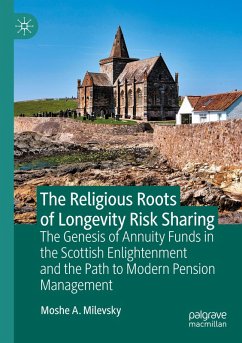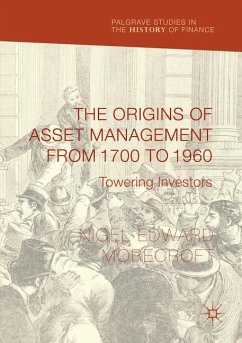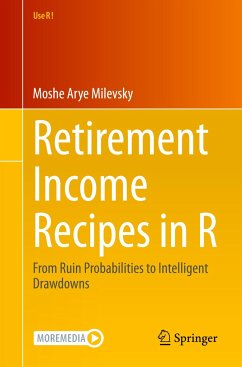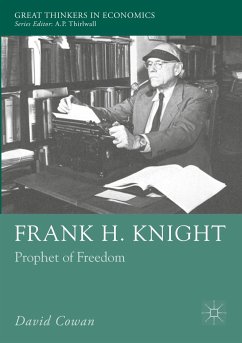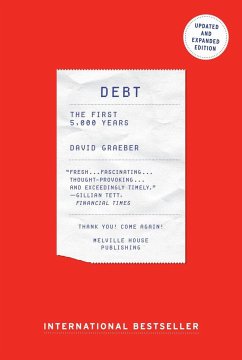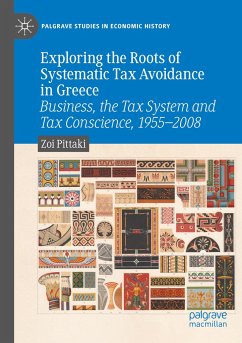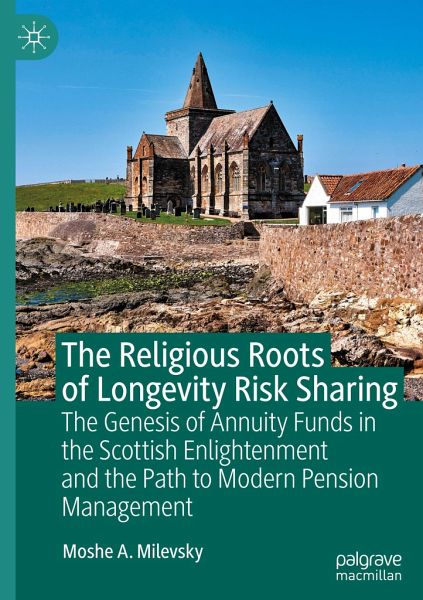
The Religious Roots of Longevity Risk Sharing
The Genesis of Annuity Funds in the Scottish Enlightenment and the Path to Modern Pension Management
Versandkostenfrei!
Versandfertig in 6-10 Tagen
98,99 €
inkl. MwSt.
Weitere Ausgaben:

PAYBACK Punkte
49 °P sammeln!
This book presents a unique historical study on the origins of longevity risk management and its links to religious institutions in the eighteenth century. Throughout history, monarchs, affluent patrons, and wealthy benefactors routinely pledged to provide their devotees with pensions or life annuities, mirroring the biblical concept of 'daily bread for life'. Until the eighteenth century, however, the uncertainty around the longevity of beneficiaries' lives and the difficulty of budgeting for random financial obligations had posed economic challenges that often led to insufficient funding and...
This book presents a unique historical study on the origins of longevity risk management and its links to religious institutions in the eighteenth century. Throughout history, monarchs, affluent patrons, and wealthy benefactors routinely pledged to provide their devotees with pensions or life annuities, mirroring the biblical concept of 'daily bread for life'. Until the eighteenth century, however, the uncertainty around the longevity of beneficiaries' lives and the difficulty of budgeting for random financial obligations had posed economic challenges that often led to insufficient funding and high default rates.
This book narrates the genesis of longevity risk pooling and the first successfully funded annuity scheme in history, an eventual prototype for national pension plans around the world. It examines how a group of Protestant clergymen, scientists, and intellectuals associated with the Presbyterian Church of Scotland pioneered innovative methods for setting up a reversionary annuity and widow's pension plan, guided by actuarial principles. Unknown to many, the economist Adam Smith, and other literati of the Scottish Enlightenment, invested in this novel annuity. Illuminating the social and theological contexts of this scheme, the book argues that religious belief played a critical role in the development of best practices around the prudent management of longevity risk. The practices, values and beliefs in divine probabilities were at the heart of these thought leaders' confidence in long-term financial projections. Shedding light on this fascinating aspect of actuarial history by an examination of the archival records, while also linking to contextual discussions of modern pension challenges, this book will be of interest to scholars and readers interested in finance, insurance, pensions, and religion.
This book narrates the genesis of longevity risk pooling and the first successfully funded annuity scheme in history, an eventual prototype for national pension plans around the world. It examines how a group of Protestant clergymen, scientists, and intellectuals associated with the Presbyterian Church of Scotland pioneered innovative methods for setting up a reversionary annuity and widow's pension plan, guided by actuarial principles. Unknown to many, the economist Adam Smith, and other literati of the Scottish Enlightenment, invested in this novel annuity. Illuminating the social and theological contexts of this scheme, the book argues that religious belief played a critical role in the development of best practices around the prudent management of longevity risk. The practices, values and beliefs in divine probabilities were at the heart of these thought leaders' confidence in long-term financial projections. Shedding light on this fascinating aspect of actuarial history by an examination of the archival records, while also linking to contextual discussions of modern pension challenges, this book will be of interest to scholars and readers interested in finance, insurance, pensions, and religion.





